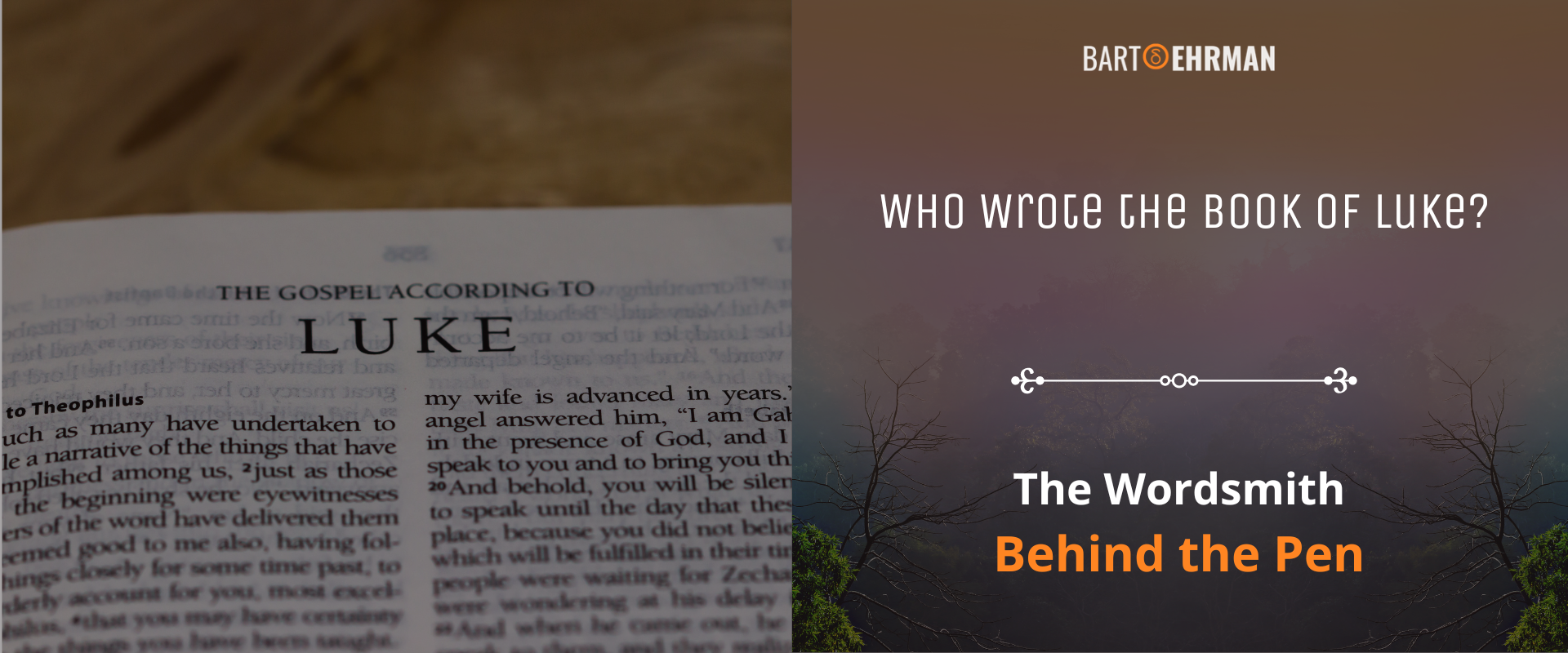Who Wrote the Book of Luke: Seeking Authorship Clues

Written by Marko Marina, Ph.D.
Author | Historian | BE Contributor
Verified! See our guidelines
Verified! See our editorial guidelines
Date written: July 26th, 2023
Disclaimer: The views and opinions expressed in this article belong to the author and do not necessarily match my own. - Dr. Bart D. Ehrman
Who wrote the book of Luke? Recently, this question sparked some controversy in Croatia, my country. It was publicly revealed that the SAT committee continues to support the traditional theory regarding its authorship.
I’m a bit surprised by this revelation as I always believed our schools keep up with the latest New Testament scholarship. It seems I was mistaken. In this discussion, I examine the authorship of the Gospel of Luke and evaluate both traditional beliefs and the opinions of biblical scholars.
If you are curious about the intriguing realm of early Christianity, Bart offers a complimentary 50-minute webinar that digs into the Gospels’ authorship. This is an exceptional chance to enhance your understanding and solve the mysteries surrounding the writers of the Gospel. Click here to join now!

The Authorship of Luke According to Traditional Theory
Who wrote the book of Luke?
Before we start our analysis, it’s important to note the Gospel of Luke is the first of two volumes written by the same author. The second volume is called Acts of the Apostles. The purpose of these volumes is to demonstrate how the gospel’s good news spread from Jerusalem to every part of the world.
According to Church tradition, the author behind the Gospel of Luke and Acts is a companion of Paul named Luke, mentioned in Col 4,14; 2 Tim 4,11; and Philem 24. The church tried to increase its authority and strength by relating these works with a companion of Paul.
However, most critical scholars are skeptical regarding the traditionally ascribed authorship of the Gospel of Luke.
Who Wrote the Book of Luke in the Bible: According to Critical Scholars
Historians determine authorship with all ancient documents based on internal evidence and external attestation. However, the notion that a companion of Paul named Luke wrote the Gospel of Luke emerged 100 years after the text was written. The earliest external attestation comes from a source called the Muratorian Canon.
Most scholars believe it dates to the late part of the 2nd century. As J. Fitzmyer notes in his commentary on the Gospel of Luke, “the first reference to the tradition can be found in the Muratorian Canon, which has usually been assigned a date ca. 170-180. C.E.”
Lines 2-8 of the Muratorian Canon read: “The third book of the Gospel is that according to Luke. Luke, the well-known physician, after the ascension of Christ, when Paul had taken with him as one zealous for the law, composed it in his name, according to [the general] belief.”
Soon thereafter, bishop Irenaeus (c. 185 C.E.) claims in his work Against the Hearesis that Luke, “the companion of Paul, has compiled the Gospel preached by that one in a book (3.1.1.)”.
Who Wrote the Book of Luke: Authorship & Anonymity
It is important to note we have quotations from the Gospel of Luke from earlier Church authors such as Ignatius of Antioch and Justin Martyr. However, they never name their source. E. P. Sanders remarks in The Historical Figure of Jesus: “The Gospels as we have them were quoted in the first half of the second century, but always anonymously. Names suddenly appear about the year 180.”
Consequently, the first external attestation for the authorship of the Gospel of Luke came a century after it was originally written. It is difficult to use this as accurate historical information. Therefore, most critical scholars reject the traditional theory.
What Does the Text Itself Say? The Internal Evidence
The book of Luke, like other gospels, does not explicitly identify the author as the companion of Paul named Luke. Unlike some ancient historians, such as Thucydides and Flavius Josephus, who identify themselves in their works, the author of Luke’s exact identity isn’t revealed.
Furthermore, Paul himself did not author the two texts (Col 4:14; 2 Tim 4:11) that mention Luke as his traveling companion. According to N. Brox’s article, these mentions emerged after Paul’s death and were fabricated based on the greeting list in Philem 24 to lend credibility to their respective authorial claims.
Historically Paul only mentioned Luke in Philem 24 as one of his associates. However, we can still discern Luke’s background based on the information within the text. As a result, internal evidence suggests that “Luke” was a highly educated author proficient in Greek.
Among all the Gospels in the New Testament, Luke exhibits the most extensive vocabulary. Additionally, he displays a deep understanding of political terminology and expertise in historical writing techniques.
Inconsistencies Provide Clues: Who Wrote the Gospel of Luke
It is important to note significant differences between what Paul says about himself in his undisputed letters and what is written in Acts. Undeniably, these inconsistencies are crucial to our discussion.
One example that illustrates this discrepancy is the account in Acts claiming that Paul immediately went to speak with the apostles in Jerusalem after his conversion (Acts 9:23- 27). However, in Galatians (Gal 1:18-20), Paul swears that he visited Jerusalem only three years later.
It is doubtful that someone who was both Paul’s associate and traveling companion would make such a serious mistake. This type of situation presents a major challenge to the theory that attributes the authorship of Luke’s Gospel and Acts to Luke, a companion of Paul.
The Gospels are indeed a mystery. The question of who wrote the gospels of Matthew Mark Luke and John leads us to more questions than answers.

But Marko! What about the We-passages?
A few months ago, I debated the authorship of the Book of Luke with a local priest. He brought up the so-called We-passages in Acts during our heated, yet respectful conversation.
In several passages of Acts (16:10-17; 20:5-15; 21:1-18; 27:1-28:16), the narrator suddenly shifts to the first-person perspective.
Could this be an argument supporting the theory that a companion of Paul named Luke wrote both Acts and the Gospel of Luke?
We-passages in a Scholarly Discourse:
WHO WROTE THE BOOK OF LUKE
Regarding the We-passages in Acts, there are three main theories.
The first theory suggests that Paul’s companion wrote Acts, but I consider this the least likely. There is internal and external evidence that contradicts the theory that Paul wrote Acts. For example, there are differences and inconsistencies between Acts and Paul’s undisputed letters, and there is no explicit identification of Paul as the author. Additionally, later attestations also suggest this theory is unlikely to be true.
A second theory posits that the We-passages represent a travel-narrative source written by someone who traveled with Paul. An unidentified author incorporated this source into the composition of Acts.
However, as Michael Wolter notes in his highly respected commentary, “All attempts to reconstruct from them a source reworked by the author of Acts run aground on the fact that the linguistic character of the We-passages is identical to that of the surrounding texts of Acts.”
Giving Words Credibility Through First Person Narration
In my opinion, the third theory seems the most plausible. It suggests that the author intentionally wrote the story in first-person narration to enhance its appeal and credibility.
Furthermore, as Bart observes in Forgery and Counterforgery, “In using the pronoun in this way, Luke is not—contrary to what is widely claimed—doing something highly unusual in Christian or other literature. Quite the contrary, the first-person pronoun (both singular and plural) was widely used in ancient texts, Christian and otherwise, precisely in order to provide authority for the account.”
If you want more extensive arguments, read Bart’s book mentioned above on forgery.
Conclusion: who is the author of the Gospel of Luke
Determining who wrote the Book of Luke isn’t as straightforward as one would hope. Even to this day, the writer’s true identity remains a mystery. Therefore, the Gospel of Luke was composed anonymously, leaving scholars to propose two plausible possibilities for the author’s ethnic background.
- One theory proposes that the author might have been a Gentile Christian with admirable knowledge of Jewish tradition.
- Another hypothesis suggests the writer could have been a Hellenized Jew residing outside of Palestine.
…and by the way, if you are wondering how my debate with a local priest ended, we respectfully agreed to disagree.
One day, you may debate someone about the authorship of the Book of Luke in the New Testament. If that’s the case, it’s essential you have access to current and reliable scholarly information. The best way to do that is by enrolling in Bart’s outstanding course, “The Unknown Gospels.” Click the link below.
FREE COURSE!
WHY I AM NOT A CHRISTIAN
Raw, honest, and enlightening. Bart's story of why he deconverted from the Christian faith.
Over 6,000 enrolled!

